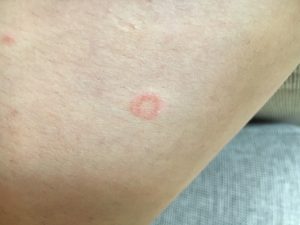Ringworm….What is it?
Ringworm is a disease of the skin, fur, and nails. Unlike its name suggests, ringworm is a fungal infection, not caused by a worm. It is most often seen in cats (particularly in kittens) but can also be seen in dogs and other species. It is important to understand that ringworm is extremely contagious and can be transmitted to you!
What does Ringworm look like?
Ringworm infections in cats can look like circular or irregularly shaped lesions on their body. Most commonly it is seen on the head, ears, and forelimbs. Often the lesions are patches of hair loss but it can be accompanied with redness, dandruff, and other generalised signs of skin irritation. Importantly, ringworm infected cats can show no signs at all and are still able to spread disease!


How does Ringworm spread?
Ringworm is spread by fungal spores via direct or indirect contact. This means it can be spread animal to animal or through contact with contaminated objects or the environment.
Diagnosis
Ringworm can be diagnosed by fungal culture or sometimes the use of ultraviolet light (some fungal species will glow under this light). However, most commonly ringworm is diagnosed by clinical signs alone.
Sometimes ringworm is suspected in animals because the owners have skin lesions. Some animals are do not show any symptoms but seem to spread the disease. Testing for these animals is done using a more expensive Fungal PCR test.
How is Ringworm treated?
Treatment is necessary for ringworm and veterinary attention is advised. Most cases will need oral antifungal treatment as well as baths in medicated shampoo.
The environment will need to be disinfected as well – this means changing bedding, thoroughly cleaning food/water bowls, vacuuming, and keeping the animal separated from any other pets in the household. A diluted bleach solution can be used to clean surfaces that have come in contact with the infected pet. It is very important to wear gloves and wash your hands thoroughly after handling a ringworm infected animal.

Make an Appointment with the Vet
or call us on 9913 7979

